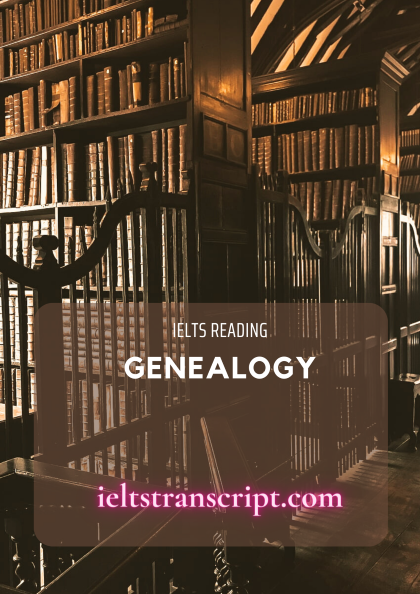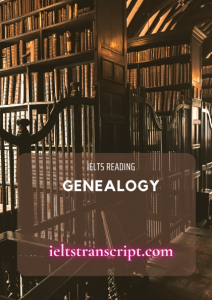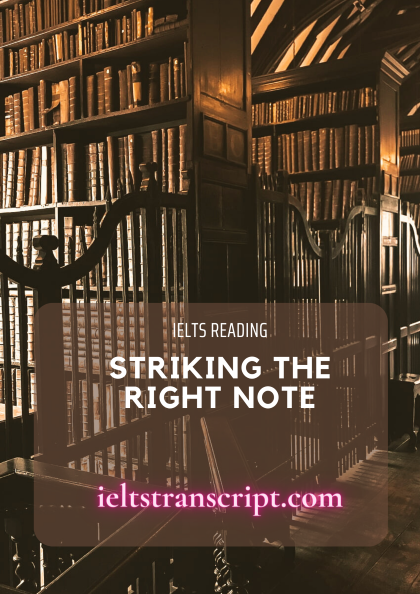- Đối với sản phẩm có giá: Sau khi chúng tôi ghi nhận thông tin đã thanh toán sản phẩm của bạn, sản phẩm sẽ được mở khóa và bạn có thể xem trực tiếp và tải tài liệu sản phẩm.
- Đối với thành viên trả phí: Bạn có thể mua và thanh toán sản phẩm với giá 0đ để tải tài liệu sản phẩm.
- Bạn có thể liên hệ với chúng tôi để được hỗ trợ mở khóa sản phẩm sớm nhất.
GENEALOGY
- Chúng tôi chấp nhận các phương thức thanh toán sau đây: Thẻ tín dụng, thẻ ghi nợ, PayPal, chuyển khoản ngân hàng và tiền mặt.
Chúng tôi sẽ không thu thêm phí cho bất kỳ hình thức thanh toán nào.
- Nếu bạn gặp vấn đề về sản phẩm của chúng tôi trong thời gian sử dụng, vui lòng liên hệ với chúng tôi để được hỗ trợ xử lý sớm nhất nhé.
Xem trước mẫu
GENEALOGY
A. Genealogy, the study of tracing family connections and relationships through history – so building a cohesive family tree, has become an increasingly popular hobby from non-specialist enthusiasts over recent decades. The introduction of the Internet has, in many ways, spurred interest levels since historical information has been made far more accessible than previously. Experts warn, however, that sources obtained from the internet must be considered with caution as they may often contain inaccuracies, often advising novice genealogists to join a family history society where they are able to learn useful skills from experienced researchers.
B. Originally, prior to developing a more mainstream following, the practice of genealogy focused on establishing the ancestral links of rulers and noblemen often with the purpose of disputing or confirming the legitimacy of inherited rights to wealth or position. More recently, genealogists are often interested in not only where and when previous generations of families lived but also details of their lifestyle and motivations, interpreting the effects of law, political restrictions, immigration and the social conditions on an individual’s or family’s behaviour at the given time. Genealogy searches may also result in location of living relatives and consequently family reunions, in some cases helping to reunite family members who had been separated in the past due to fostering/adoptlon, migration or war.
C. In Australia, there has been a great deal of interest of late, from families wishing to trace their links to the early settlers. As a result of the loss of the American colonies in the 1700s, Britain was in need of an alternative destination for prisoners who could not be accommodated in the country’s overcrowded penal facilities. In 1787, the ‘First Fleet’ which consisted of a flotilla of ships carrying just over 1300 people (of which 753 were convicts or their children and the remainder marines, officers and their family members) left Britain’s shores for Australia. On January 26, 1788 – now celebrated as Australia Day – the fleet landed at Sydney Cove and the first steps to European settlement began.
D. Genealogy research has led to a shift in attitudes towards convict heritage amongst contemporary Australian society, as family members have been able to establish that their ancestors were, in fact, not hardened and dangerous criminals, but had, in most cases, been harshly punished for minor crimes inspired by desperation and dire economic circumstances. So dramatic has the shift in attitudes been that having family connections to passengers on the ‘First Fleet’ is considered nothing less than prestigious. Convicts Margaret Dawson and Elizabeth Thakery were amongst the first European women to ever set foot on Australian soil. Details about the former, whose initial death sentence passed for stealing clothes from her employer was commuted to deportation, and the latter expelled for stealing handkerchiefs along with others of similar fate are now available on the internet for eager descendants to track.
E. Although many of the deported convicts were forbidden to return to Britain, others such as Dawson, were, in theory, expelled for a given term. In reality, however, the costs of attempting to return to the mother country were well beyond the means of the majority. Genealogists now attribute the successful early development of Australia to such ex-convicts who decided to contribute fully to society once their sentence had been served. Many rewards were available to prisoners who displayed exemplary behaviour, including land grants of 30 acres or more, tools for developing and farming the land and access to convict labour. Genealogy studies also show that many former prisoners went on to hold powerful positions in the newly forming Australia society, examples being Francis Greenway – a British architect expelled on conviction of fraud – who went on to design many of
...GIA PHẢ HỌC
A. Gia phả, việc nghiên cứu để truy tìm các mối liên hệ cũng như mối quan hệ trong gia đình qua lịch sử – để xây dựng một cây liên kết phả hệ, đã trở thành một sở thích ngày càng phổ biến của những người đam mê không chuyên trong những thập kỷ gần đây. Sự ra đời của Internet, theo nhiều cách, đã thúc đẩy mức độ quan tâm vì thông tin lịch sử đã được làm cho dễ tiếp cận hơn nhiều so với trước đây. Tuy nhiên, các chuyên gia cảnh báo rằng các nguồn thu được từ Internet phải được xem xét thận trọng vì chúng có thể chứa thông tin không chính xác, họ thường khuyên các nhà nghiên cứu phả hệ mới vào nghề nên tham gia một cộng đồng nghiên cứu phả hệ, nơi họ có thể học hỏi các kỹ năng hữu ích từ các nhà nghiên cứu giàu kinh nghiệm.
B. Ban đầu, trước khi phát triển dòng dõi chính thống, việc nghiên cứu phả hệ tập trung vào việc thiết lập mối liên hệ tổ tiên của những người cai trị và quý tộc thường với mục đích tranh chấp hoặc xác nhận tính hợp pháp của các quyền thừa kế về tài sản hoặc địa vị. Gần đây hơn, các nhà phả hệ thường không chỉ quan tâm đến nơi và thời gian các thế hệ trước của gia đình sinh sống mà còn chi tiết về lối sống và động cơ của họ, giải thích tác động của luật pháp, hạn chế chính trị, nhập cư và điều kiện xã hội đối với hành vi của một cá nhân hoặc gia đình tại các thời gian nhất định. Việc nghiên cứu phả hệ cũng có thể tìm được vị trí của những người họ hàng còn sống và đoàn tụ gia đình, trong một số trường hợp, còn giúp các thành viên trong gia đình đã bị chia cắt trong quá khứ do nuôi dưỡng / nhận con nuôi, di cư hoặc chiến tranh để đoàn tụ.
C. Ở Úc, về sau có rất nhiều sự quan tâm, từ các gia đình muốn tìm ra mối liên hệ của họ với những người định cư. Do mất các thuộc địa Mỹ vào những năm 1700, nước Anh cần một điểm đến thay thế cho những tù nhân không thể tạm trú trong các cơ sở hình sự quá đông đúc của đất nước. Năm 1787, ‘Hạm đội thứ nhất’ bao gồm một đội tàu chở hơn 1300 người (trong đó 753 người bị kết án hoặc con cái của họ và những người còn lại là thủy quân lục chiến, sĩ quan và các thành viên gia đình của họ) rời bờ biển của Anh để đến Úc. Vào ngày 26 tháng 1 năm 1788 – ngày nay được kỷ niệm là Ngày Úc – đội tàu đổ bộ xuống Sydney Cove và những bước đầu tiên để định cư của người châu Âu được bắt đầu.
D. Nghiên cứu phả hệ đã dẫn đến sự thay đổi thái độ đối với người bị kết án trong xã hội Úc đương đại, vì các thành viên trong gia đình đã có thể xác định được rằng tổ tiên của họ, trên thực tế, không phải là những tội phạm nhẫn tâm và nguy hiểm, nhưng trong hầu hết các trường hợp, đã bị trừng phạt nghiêm khắc vì những vi phạm nhỏ gây ra từ sự tuyệt vọng và tình hình kinh tế khủng hoảng. Sự thay đổi thái độ mạnh mẽ đến mức có được sự kết nối gia đình với các hành khách trên ‘Hạm đội thứ nhất’ được coi là rất đáng chú ý. Những người bị kết án Margaret Dawson và Elizabeth Thakery là một trong những phụ nữ châu Âu đầu tiên đặt chân lên đất Úc. Thông tin chi tiết về họ, người đầu được thông qua án tử vì ăn cắp quần áo của người chủ nhưng đã bị trục xuất, và người sau cũng đã bị trục xuất vì ăn trộm khăn tay cùng với những người khác có số phận tương tự hiện đã bị đăng tải trên Internet để con cháu theo dõi.
E. Mặc dù nhiều người trong số những người bị kết án trục xuất và cấm quay trở lại Anh, những người khác như Dawson, về lý thuyết, đã bị trục xuất trong một thời hạn nhất định. Tuy nhiên, trên thực tế, chi phí cố gắng trở về nước mẹ vượt quá khả năng của đa số những bị trục xuất. Các nhà phả hệ học hiện tại cho rằng sự phát triển thành công ban đầu của Úc là do những người từng bị kết án quyết định cống hiến hoàn toàn cho xã hội sau khi bản án của họ hết hiệu lực. Nhiều phần thưởng đã được trao cho những tù nhân có hành vi gương mẫu, bao gồm cấp đất từ 30 mẫu Anh trở lên, các công cụ để phát triển và canh tác trên đất và tiếp cận với lao động bị kết án. Các nghiên cứu phả hệ cũng cho thấy nhiều cựu tù nhân đã nắm giữ các vị trí quyền lực trong xã hội Úc mới hình thành, ví dụ như Francis Greenway
...Để xem được đầy đủ nội dung và tải dữ liệu, bạn phải trở thành thành viên của chúng tôi và trả phí cho tài liệu (nếu có)












